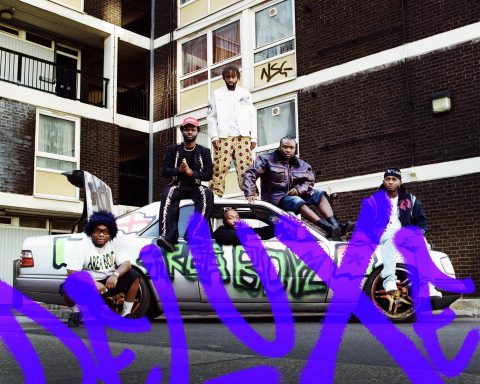Barely two months after the debut of Billion Dollar Baby, and only a month after its deluxe, Seyi Vibez is back with another project. This time a mixtape, Memory Card was released on the 6th day of the new year, and it is clear the Street Pop star intends to be the early bird that catches the worm in 2023. A lot of parallels have been drawn between Seyi Vibez and Asake, 2022’s breakout star turned artist of the year, but those accusations of copying are partly down to an eagerness of fans to drum up competition, and should ease when more creatives step into the neo-fuji–house range the artists currently operate in.
Where Seyi Vibez will hope to be mentioned in conversations with Asake is with an early release barrelling into a successful music year. Memory Card is as close as he’s come to the completion of his arc, but it’s important to recall his journey here. His 2021 album, No Seyi No Vibez (NSNV), was a perfectly adequate Street Pop piece, as he chronicled his desire to make it out of the hood, in location and status, over traditional Afropop beats. As good as it was a debut, NSNV couldn’t provide the spark he needed to announce himself in the music scene.
His post-album releases strayed further from generic Street Pop, as he first got acquainted with log drums in “Gbemidebe”, which featured Bella Shmurda. At the turn of the new year 2022, he made the biggest leap towards his current form, as the song, “C Major”, unveiled his signature vocal distortion and a less dense production, two features he would hold on to in the future. Revolutionary as it was to his direction, “C Major” did not bring a significant boost to his profile, but rather than turn back, Seyi Vibez would dig himself deeper with “Billion Dollar”.
With this song he introduced crowd vocals and soulful horns, while his message remained unchanged — belief in a prosperous future that was unshaken even by a disadvantaged present. For its video he began to look the part of the eccentric act he was building to become, the dyed-haired, leather sporting character. “+234” and “Bullion Van” pulled him further into his new creation — especially the latter with its reliance on a crowd-backed chorus and a talking drum — and afterwards it became necessary to piece together a coherent piece from this patchwork, as a result of which the album, Billion Dollar Baby, was born.
Ironically, a bigger mainstream following is more readily accessible to those who are willing to break away from conventional sounds, as evidenced by Street Pop acts like Zinoleesky and Asake striking gold after importing elements of South African house music. Seyi Vibez’s experimentations are closer to the latter’s, but crucial differences exist. Where Asake’s delivery is beat heavy, Seyi Vibez relies more on Amapiano production that is without its big drums, and he incorporates a lot more string and horns in its place.
Seyi Vibez’s artistic choices can be sharply polarising. His tendency to ignore the direction of a moving beat, and instead take a few seconds to chant his lines, may be a homage to the Ifa and Fuji influences at the very root of his music, but there are some who assume it to be an artistic error. They fault him for accidentally stepping out of rhythm with the beat — as if that were somehow possible in a studio with competent producers and sound engineers. So while a few cannot get into his music, others cannot get enough, and for the same reasons.
Seyi Vibez, like he should, ignores the naysayers to focus on supporters, and it is for them he has curated this mixtape. He anticipates the general reaction to the release of his third project in as many months, and he comes with answers. “Para Boi”, the second of five tracks here, is Memory Card‘s answer to “Chance” on Billion Dollar Baby and “Kun Faya Kun” on the 2.0, in its Amapiano leaning that is once again miserly with heavy drums. He treats the accusation of “Say I too dey drop song”, retorting with “Calming down is not recommended” and later rousing himself to even more exploits with “Ahead ahead/ Ororo dey my head”. It is the right way to approach Nigeria’s music scene as an up and comer already making some waves and looking to transcend levels; a moment’s rest may mean a missed window.
The opener, “G. O. A. T.” paints a picture of what he envisions to be at the tail end of all this hardwork. He brilliantly samples Fatai Olowonyo’s “Elewure Wole”, complete with backup vocals delivered by an actual goat, which serves the double purpose of paying respects to a late Apala legend from the past and bigging up his own future. He ties into Yoruba folklore once more, beginning and ending with a song that was mostly used to intersperse late night folktales: “Alu jan-jan kijan/ Alu jan-jan kijan”. His own fairytale he scripts in the single verse, praying for the day his hustle pays off and he can live his dreams: A Grammy award, love from the streets and tours in exotic cities.
“Love Is War”, the album closer, has him drawing from an even more surprising pool, as he teams up with American rapper, Yxng K. A., for an emotional track about love and relationships, but mostly how to get over one. Lyrics like “Girl, I don’t know what I would do without you/ I’m in love with everything about you” were nobody’s expectation coming into a Seyi Vibez mixtape, and it is clear the singer wants to keep you on your toes trying to guess his direction. It is important for anti-conventional stars to not accidentally fall into their own stereotypes while trying to evade others, and Seyi Vibez closes his album like this as a warning to those who would be quick to define the extents of its creativity. And for what it’s worth the song is executed very well, as Seyi Vibez follows his guest into the world of Emo Rap without appearing out of place.
On the other two tracks of the mixtape there are no new surprises. “Alaska” and “IG Story” (as well as “G.O.A.T”) are produced by frequent collaborator The Beat Murderer (or TBM), who took a similar front seat on Billion Dollar Baby, most importantly to help bring “Chance” and “Kun Faya Kun” to life. On “Alaska” he plays with familiar elements, but some parts of the track are put through too many beat stops, and like a road with frequent speedbumps it does not make for a very smooth experience. When the song is allowed to flow, though, Seyi Vibez is able to make yet another nod to his music roots, employing Islamic vocals that once inspired Fuji music at its origin.
“IG Story” is vocal driven, as TBM keeps production light, though he continues to flirt with Amapiano by summoning its rhythms and characteristic whistles. Here Seyi Vibez sets to address his detractors who queried his rapid rise in Instagram followers by alleging they must have been bought, but he gets sidetracked with local slang and never gets to land a proper comeback on them. He says later, “We just having fun/ Awon temi de ti mo”, and with the number of vocals layered for the track, it really does feel like a “we”.
Seyi Vibez has struck gold with his recent musical direction, the evidence of which he releases in batches every month or so. Hard work paired with talent is an effective combination you should hope to have in any endeavour, and especially in Nigeria’s current music industry that is packed with too many creatives trying to climb the next rung of the ladder. With each release, however, Seyi Vibez convinces more and more he is in possession of both these virtues, and getting an early start to 2023 means he can not only sustain the momentum he ended last year with, but also ride it to the dream career and life he has sang about for years. It’s just like he promises on “Alaska”: “watch out for second half”.









It¦s actually a great and helpful piece of information. I¦m satisfied that you simply shared this helpful info with us. Please stay us informed like this. Thanks for sharing.
[…] The current clouds over him are mostly contained in a newly woven ‘competition’ with Seyi Vibez, of course conjured by Nigerian music fans that love to goad two rams into a circle they formed and […]